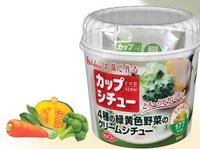 Dydo
Dydo has just released
Yuzu Lemon, a drink containing
Yuzu (Japanese citrus) and lemon honey. Introduced in 2004, it was especially popular with middle-aged and elderly consumers, and so Dydo decided to release it again this year. The lineup has been expanded to include a version to be sold hot.
Yuzu has a unique aroma, which Dydo says evokes the feeling of
"wa", a distinctive Japanese concept that can be best translated as harmony. Also the package design – which is intended to resemble earthenware – aims to convey this. Furthermore, the package design contains no Roman letters or English slogans, and Dydo uses only Yuzu grown in Japan, which it claims has a superior flavor.
This makes Yuzu Lemon an interesting example of what could be called the “new conservatism” in consumer goods. New conservatism manifests itself in a preference for products that remind consumers of traditional Japan and a feeling that Japanese products and ingredients are superior. It is reflected not only in the products themselves but also - and sometimes this is even more important - in the package design. And although these preferences seem to be increasing in all age groups, they certainly also reflect the increasing influence of older consumers.









